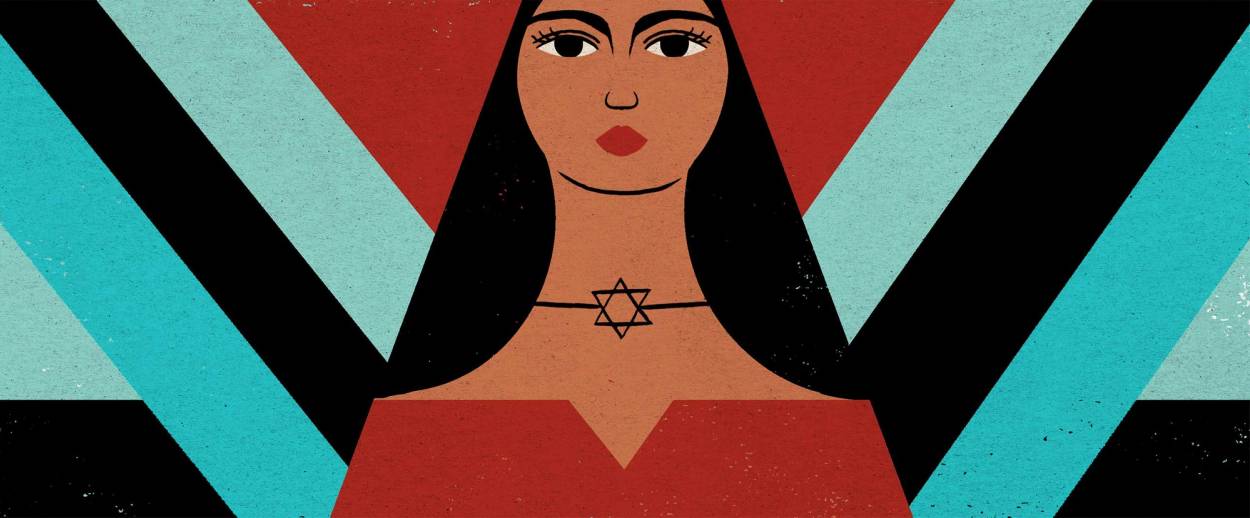Anti-Zionism Has No Place in the Progressive Movement
Campus Week: A guide for Jewish students and their elders




Anti-Zionism ghettoizes Jews from the rest of the justice movement, putting a wall around us that separates us from other marginalized people. It cannot be reconciled with any movement striving for inclusivity. It denies us access to solidarity-based movements which should be fighting for equality, for historically oppressed peoples. As American Jewish students return to campus, they should prepare to be challenged academically and intellectually, and should also prepare to challenge movements that don’t respect Zionism and their Jewish heritage.
Self-determination is a human right, and one that for over 2,000 years Jews longed and prayed for. Jews suffered greatly, often catastrophically, while living with the vulnerability of statelessness. We faced violence, discrimination, disenfranchisement, denaturalization, and genocide. The longing for statehood and a return to our indigenous homeland is present throughout our liturgy and texts.

The global Jewish community has long embraced Zionism as central to our liberation, and continues to do so. Eighty-one percent of American Jews between the ages of 18 and 29 consider “caring about Israel” to be “essential or important” to being Jewish. Sixty-six percent of American Jews consider Israelis to be part of their extended family. The demand that Jews discard a key element of our liberation, culture, and identity to join a social justice movement is anything but progressive. It is a radical silencing and rejection of core parts of our history and identity as an oppressed people.
Just as advocates for justice demand a better America for everyone, they can demand a better Israel. American Jews and Israelis of all ethnic backgrounds criticize Israeli policies regularly, including those that impact Palestinians in Gaza and the West Bank. Criticism of Israeli policy is not in and of itself anti-Semitic. Debates over specific Israeli policies, and fierce criticism of the Netanyahu government, has a place on American campuses.
But the notion that Jewish self-determination is a form of racism is purely anti-Semitic. If you do not believe that self-determination is a human right, or are an anarchist anti-nation-state radical, I’ll accept that there is no anti-Semitism in your anti-nationalism. That said, if you believe in the right of South Sudan, Kurdistan, and Kosovo—and France, and Sweden, and Japan, and Ghana—to exist, you should embrace self-determination for Jews. Academic rhetoric that applauds ethnic cleansing, terrorism, forced relocation, and the dismantling of the Jewish state should be challenged at every opportunity. Attempts to intimidate and silence Jewish students who are Zionists are civil rights violations.
I experienced a variety of anti-Zionism and anti-Semitism in my college days at Bennington, a small, left-leaning college in Vermont. I had a classmate show up to my dorm for a Halloween party dressed as a “Palestinian Freedom Fighter” including a fake bomb strapped to his back. After mentioning in the dining hall that I had just returned from interning in Haifa, a classmate asked how many Palestinian babies I had killed. When I explained I’d been interning with a binational feminist coalition and had worked alongside Palestinian feminist colleagues, I was called a liar and a baby killer. A classmate at a party once literally booed me when I mentioned I was heading back to Israel to do research for my senior project.
While I experienced anger and ignorance, I was also met with respect and request for dialogue. When I met with professor Mansour Farhang to ask to join his honors course on Middle Eastern studies, he asked if I had traveled to the region. Farhang served as revolutionary Iran’s first ambassador to the United Nations, so I wasn’t sure how he would respond when I told him I traveled to Israel twice to volunteer. He smiled and said, “Good! That’s very good! I love to have kids like you who have just been to Israel in the class!” He rubbed his hands together and his eyes twinkled, “Makes for good class discussion! I bet you’ll have strong opinions!”
He was accurate about that. Our conversations were heated, but respectful. He made sure I was never othered based on my ethnic background. Conversations with my classmates often carried on for hours after class ended, but they honored his respectful tone. In 2006 I needed an academic adviser who would back my travel to Israel for research relating to my senior project. Various faculty declined, concerned about my safety due to the Second Lebanese War. Farhang agreed to sponsor me, trusting my judgment and wanting me to have the opportunity to complete my degree with the academic focus I was passionate about. He respected my work, my college experience, and my learning. To this day, I have no idea what his personal political views on the conflict are, but I was able to share a wide variety of views—on anything from Gaza evacuees to Palestinian peace activists—on campus due to his mentorship. This is the standard that professors should strive to, to teach facts and theories, encourage robust debate, and show respect to their students and their academic trajectories, especially when students hail from historically marginalized communities with a vested interest in the subject.
Yet this kind of respectful detachment is a far cry from what many Jewish students experience on campuses today. Professors with no expertise in Middle Eastern studies or the Palestinian/Israeli conflict feel comfortable refusing to write recommendations such as the one granted to me by Farhang, due to their adherence to the tenets of BDS. Anti-Semitic events surged 60 percent in 2017, according to the Anti-Defamation League. Anti-Semitic incidents on campus nearly doubled for the second year in a row, with offenses on some campuses coming more often from the left than from the right.
Jewish students, I encourage you to raise your voice and be heard, and be proud of your history and your communities, and your attachments. It is frightening in the beginning, but as you talk you will find your own voice, and find that it is stronger than you could have imagined. Challenge the idea that there are no Zionists in the room, no Jews in the room, or that you plan to play by anyone else’s “Good Jew” rules. I found once I started talking, I felt braver, safer, and stronger—even when I was met with hatred.
Second, lean on the global Jewish community for support and guidance. Reach out to the Jewish community, both online and off. Lean into your local Jewish community, be it Hillel, Chabad, a local synagogue, or a simple gathering of friends. Find a local support structure and then give the rest of the community an opportunity to invest in it with you. Use resources from the ADL, American Jewish Congress, the David Project, and many others who want to support you. Call us if you need resources and skills training. Call us if you are frightened. We want to invest in you and your future and your well-being. Tell your family and your alumni network what you’re experiencing, and work with them to make a plan to address the hatred you are facing.
Thirdly, and most importantly, involve yourself in advocacy—both for the Zionism we have now and the Israel you dream of.
Anti-Zionism seeks to intimidate you and silence you. It seeks to strip you of your history and culture, and decide who Jews are and what our history is. That’s wrong. The more you take ownership of your heritage, your culture, and your politics, the stronger and more successful you will be.
Fight for a campus that respects you, your Judaism, and your Zionism. Fight for a progressive movement that values you as a fully actualized person and is inclusive of you and your heritage even when you have serious disagreements on specific policies. Fight for an Israel that reflects your Jewish values by supporting organizations in Israel. Fight for a Zionism that you define, that you believe in, with policies you support.
Progressive parents with substantive disagreements with the Netanyahu government and its policies must talk to our children about why we are still Zionists, just like we still love America even though we despise President Donald Trump. We must stand up and raise our voices, advocate for the Israel we want to see and the Israel we believe in, and support the youth who are facing the brunt of anti-Zionism. We must continue to raise our voices, build and strengthen community, and advocate for a progressive movement that welcomes American Jews and our views on Israel. This is vital not just for the sake of American Jews in progressive politics, but for the progressive movement itself. For American progressivism to succeed it needs to live its values and welcome Jews, who have always been major contributors in terms of organizing, advocacy, policy, and fundraising.
Zionism poses a test to the modern progressive movement: Can we truly welcome historically marginalized people and their perspectives, even when there are substantive disagreements? Progressives can and should debate Israeli government policies, and American government policies, and Chinese government policies, and stand firmly on the side of justice. In doing so, they must not impose litmus tests for Jews or disregard the historical Jewish experience of marginalization, oppression, and mass murder—and they must acknowledge Jewish self-determination in our indigenous homeland as a human right.
***
Read more from Tablet’s Campus Week.
Carly Pildis is the Director of Grassroots Organizing for the Jewish Democratic Council of America, and an advocacy professional based in Washington, D.C. Her Twitter feed is @carlypildis, and her website is www.carlypildis.com.